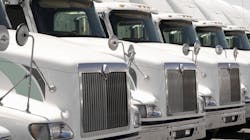I continue to be amazed at how quickly the trucking industry has reacted to the need to operate more fuel-efficient trucks that burn less diesel, looking at alternative ways to fuel commercial vehicles and beginning to focus on getting to zero emission.
Last week, along with folks from Daimler and Cummins, I participated in an event for Amazon where we got to speak in front of owner-operators and small fleets about these very topics.
See also: Volvo ‘ecosystem’ takes on tall task of EV charging
Some people believe that this move to a cleaner transportation future is going to be detrimental for owner-operators and small fleets because of the cost of alternative-fuel vehicles and clean diesel trucks. I get that, but I don't believe it.
In my opinion, people are too quick to count these smaller truck operators out. I compare it to people saying for decades that only big corporations will survive and that small businesses don’t stand a chance. The reality is quite different. According to the Census Bureau, there were nearly 5.4 million applications filed to form new businesses last year. Estimates are that there are 30.2 million small businesses in the U.S. today. I am not naïve, and I do know that a number of startups fail, but the reality is small businesses keep opening and many are successful.
Moving goods in North America has always involved a huge number of small businesses. Based on that, I think it is way too soon to count out small fleets and owner-operators simply because trucking is moving into a more sustainable future.
For one thing, these smaller fleets and owner-operators purchase used trucks and are likely to be in the third or fourth wave of electrification provided by manufacturers. By that time, I believe the cost of the equipment will have come down significantly. Even though many of the people in the audience last week were years away from owning an alternative-fuel vehicle, they still were very interested in learning about them. And it is possible to sign on to use a fleet’s vehicles and get in the seat of these vehicles much earlier.
See also: Kenworth, Toyota tout Class 8 fuel-cell EV capabilities
It's encouraging to me that there is so much interest by carriers of all sizes to decrease the emissions generated during the transportation of goods. While the larger fleets have the resources and wherewithal to be on the leading—and in some cases bleeding—edge of new technology, smaller fleets and owner-operators have shown an interest in getting to zero, too.
We all don’t have to get there first. We all just need to get there in a time frame that makes financial and operational sense. The fact that these smaller fleets and owner-operators are starting their journey by gathering information and asking questions is very encouraging and bodes well for a clean future for transportation, maybe sooner than some people think.
Michael Roeth has worked in the commercial vehicle industry for nearly 30 years, most recently as executive director of the North American Council for Freight Efficiency (NACFE). He serves on the second National Academy of Sciences Committee on Technologies and Approaches for Reducing the Fuel Consumption of Medium and Heavy-Duty Vehicles and has held various positions in engineering, quality, sales, and plant management with Navistar and Behr/Cummins.
This blog originally appeared on FleetOwner.com.
About the Author
Michael Roeth
Executive Director
Mike has worked in the commercial vehicle industry for nearly 30 years, most recently as the Executive Director of the North American Council for Freight Efficiency. Mike is also leading the Trucking Efficiency Operations for the Carbon War Room. Mike’s specialty is brokering green truck collaborative technologies into the real world at scale. He has a BS in Engineering from the Ohio State University and a Masters in Organizational Leadership from the Indiana Institute of Technology. Mike served as Chairman of the Board for the Truck Manufacturers Association, Board member of the Automotive Industry Action Group and currently serves on the second National Academy of Sciences Committee on Technologies and Approaches for Reducing the Fuel Consumption of Medium- and Heavy-Duty Vehicles and has held various positions in engineering, quality, sales and plant management with Navistar and Behr/Cummins.
